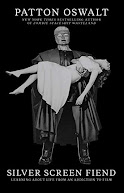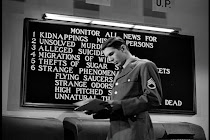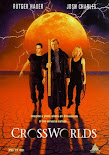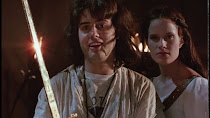And now for something completely different…
Everyone else is talking about how soulless IP is, so since that’s covered I thought instead I’d answer a question sent to me over on Twitter. Which was…
“As a bad movie expert, where does one find the good b-movies that come out nowadays? Is there a modern day Roger Corman?”
Okay, first off, there are people who’ve put far more study and hours into B-movies (bad and good) than I ever have (seriously, check out Patton Oswalt’s Silver Screen Fiend). I watch a lot of them, yeah, but I freely admit there are some holes in my education. On the other hand, I also have a much more rounded film education than a lot of folks—being a huge fan, having worked as a film journalist, and having worked both above and below the line on film projects. I worked on a movie that spent three weeks at number one at the box office, another movie that’s considered one of the worst films ever made, and a double-handful of movies I guarantee you’ve never, ever heard of.
All that said, I think B-movies have a fascinating history, and I think we need to consider it—and how we define them—in order to answer that question.
On the off chance you didn’t know, B-movies started out as the lower-billed movie on a double ticket. You’d go to the movies for your big-budget studio picture (sometimes costing hundreds of thousands of dollars), but the studio’d also tack on something a little simplistic and low-brow so you felt like you were getting your full 40¢ worth. Usually this was a genre movie—westerns, horror, comedy, early sci-fi stuff. Some of it was even based on hahahhahhaaaacomic books.
Plus, this became an entry point for writers, directors, actors… Move to
Then came the 1970s. The 70s blew the idea of “B-movies” out of the water and upended the whole film industry. Jaws. Halloween. Star Wars. There was a sci-fi boom and a horror boom. Suddenly what had been B-movies were dominating the box office.
So we had an early 80’s rush of people trying to copy that success. Lots of studios tried to manufacture B-movies with the intent of them becoming megahits. And within just a few years of that we had even more radical changes in the industry. Cable television and home video. Now there was a desperateneed for content. We need to fill video store shelves and tens of cable channels!
So this, in my opinion, is the second golden age of what we tend to think of as B-movies. Once again, we need stuff so people feel like they’re getting their money’s worth. Lots of cheaper movies aimed at pure entertainment more than art.
It’s important to note these were all still people with a degree of training. They weren’t grabbing people in
(minor segue—go read Bruce Campbell’s If Chins Could Kill for a great story of him, Sam Raimi, and Rob Tapert trying to screen an 8mm print of their movie that they’d already blown up to 16mm and then tried to blow up again to 35mm)
So, in my eyes, this second golden age (silver age?) re-established B-movies as stepping stones. Studios were now willing to take some gambles on lots of lower-budget stuff, and there were a lot of films that needed filmmakers. And even if they were less experienced, they still had basic, baseline experience.
I also think this is why there are so many great B movies from this era. It was a perfect confluence of lots of experienced, dedicated people waiting for an opportunity and studios willing to take lots of chances. Or at least say “Yeah, sure, whatever… just have it done by the 15th.” Which also meant some people had a chance to slip in a little art after all…
But as studios evolved, we began to see less and less of these low budget B-movies as execs leaned more and more into what we usually now call “tentpole” movies. Things either got larger budgets or… got forgotten. Heck, there was a brief-point in the late 90’s when horror movies almost broke out of their low-budget niche and started getting $40, $50, and even $60 million dollar budgets. But it didn’t last long and that’s a whole ‘nother story.
SyFy. Or, as it was known then, the Sci-Fi Channel.
There was a solid seven-eight year period where SciFi Pictures put out a new original movie every single week. Plus a few multi-part miniseries. Remember that? It was one of their claims to fame. Seriously, go look up Sci-Fi Pictures and see how many movies they put out. And then they became SyFy and put out that many more again. There’s close to a thousand movies altogether on those lists, spread over a little less than a decade. Sci-fi, horror, fantasy. Were they all winners? Hell no. But even if we only say 20% of them are worth watching, that’s still around 200 solid movies. More importantly, it created opportunities again and gave a lot of skilled (and, yeah, some not-so-skilled) people the chance to move up a notch or three on the
Now, with all that in mind, the original question. Where do we find B-movies today?
I don’t think they really exist anymore. Sorry.
Today we live in a world that’s both wonderful and, well, a little troublesome. Today most of us are carrying whole camera/editing packages around with us. You might even be reading this on one. It’s ridiculously easy to shoot a movie today. Anyone can, experienced or not.
And on one level, that’s fantastic. I’m a huge fan of giving everyone the tools to do the thing they love. I mean, how many fantastic filmmakers did we lose because they couldn’t make it out to
On another level, I think this easiness encourages a lot of folks to leap ahead before they’re really ready. They’re getting stuck in, as the Brits say, without understanding a lot of the concepts I mentioned above. And again—on many levels this is great. You can try different shots, experiment with lighting and effects, and find out if Wakko can really act or hasn’t improved since that fifth grade play. And you can do all this for free—no worrying about the price of film or equipment rentals or truck rentals to haul around the equipment.
But I think for a lot of folks the current mindset tells us this isn’t practice, it’s the finished product. It’s done and ready to go. And there are lots of studios and distributors who are fine with slapping a logo on those practice shots, FX tests, and audition tapes and putting them out there. Honestly, if the technology existed back in the ‘80s and early ‘90s, they probably would’ve done it then, too.
That’s why, in my opinion, we don’t see those kind of quality B movies being made right now. Not in any sort of quantity, anyway. Studio/ distributors aren’t dependant on the pool of people who already know how to make movies and just need someone to make an investment in them. Distributors can get lesser movies for pennies, fill all the empty spaces in those digital shelves, and easily make back the minimal amount they paid for it.
Again, for the people itching to fight—I’m not saying there aren’t any good movies made this way. But they’re very, very rare. Much rarer than they were when the requirements tended to favor filmmakers who already had a degree of experience. I’ve been doing this Saturday geekery thing for a little over three years now, probably close to 45 weekends a year, easily averaging three movies each time. And in all that time of watching “B-movies” made in the past twenty years I’ve stumbled across… six? Maybe seven where I said “Holy crap, you all need to watch this.”
And as far as being a stepping stone, well… This is already super-long, but let me close with a quick story.
Way back in the day, a friend and I had worked up a pitch for a potential series, and we were toying with the idea of shooting a quick teaser trailer for it. This was when “sizzle reels” were really common, to give producers a sense of what the finished product would be like. We talked about it with a producer friend of ours and she shook her head, vigorously, and told us it’d be a waste of money.
The problem, she explained (and I’m paraphrasing) is that the people who make the big money decisions rarely have great imaginations. They don’t look at something and see potential, they look at it and just see what it is. If we shot a super low-budget, semi-professional trailer for our high-concept sexy-vampire-wars series, they wouldn’t imagine it with better lighting or hotter actors or cooler stunt work. All most of them would see is… a super low-budget, semi-professional trailer.
Which meant we’d probably make a super low-budget, semi-professional show, right?
Which is why a lot of these films never really work as stepping stones.
And that’s waaaaaay too much about B-movies. But to be honest, it was something I’d been thinking about before the question was asked.
Take care of yourself, wear your mask, go write.











